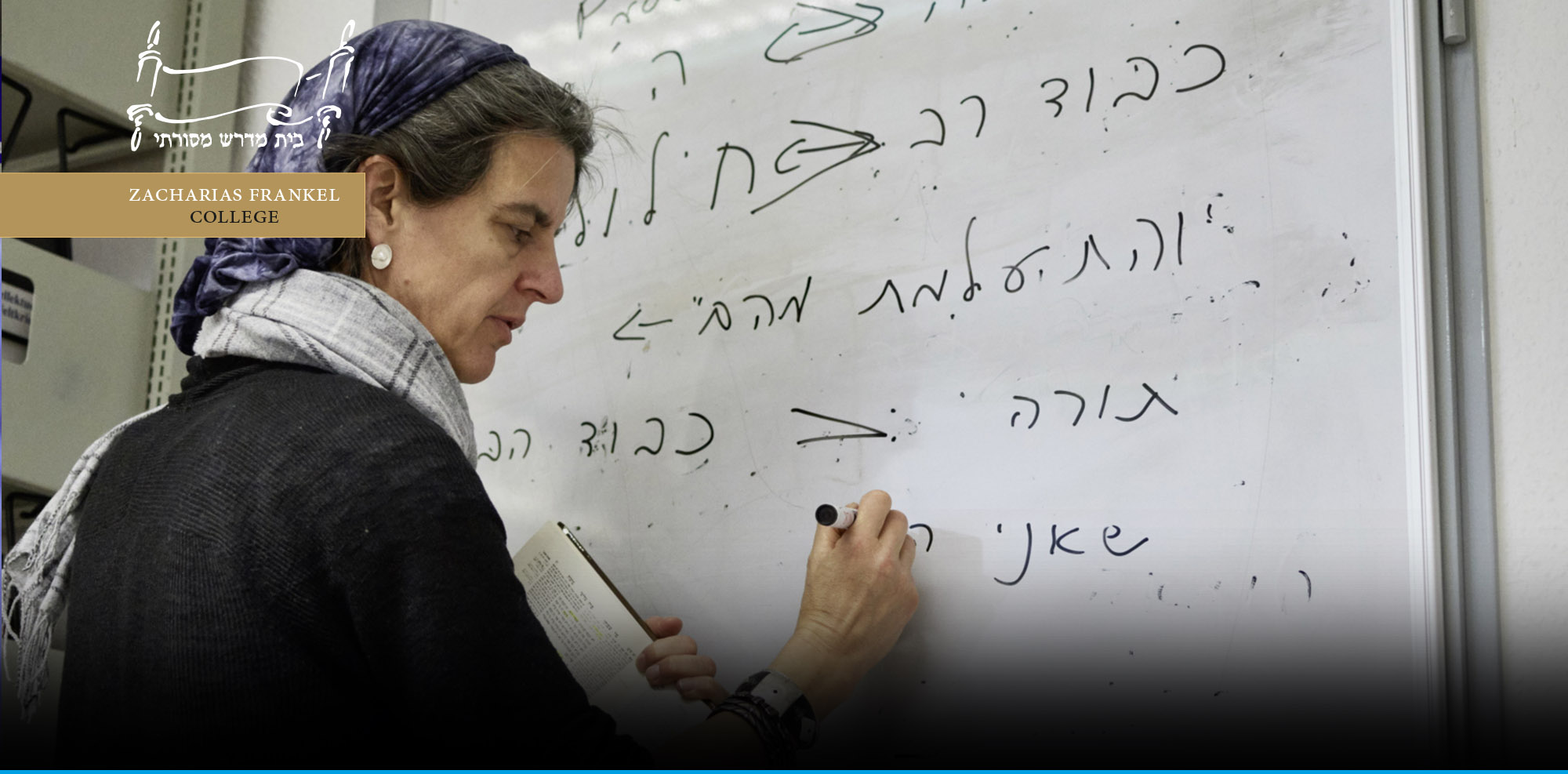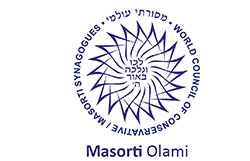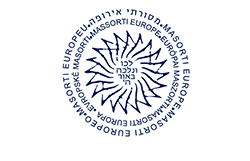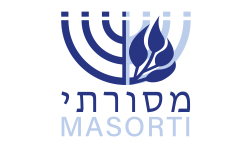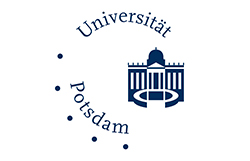How long are the rabbinical studies at ZFC?
The standard programme consists of five years of study, including a Bachelor’s and Master’s degree at the School of Jewish Theology at the University of Potsdam, and a year of yeshiva studies in Israel at the Conservative Yeshiva.
Who can become a rabbi?
The studies are open to all men and women committed to the Jewish people, whose values and practice align with those of the Masorti movement. In most cases, candidates are expected to have already been active in the Jewish community, and to have some study experience.
How much do the studies at ZFC cost?
There are no fees for rabbinical studies at Zacharias Frankel College. There is a small fee (currently 278 euro per semester to be paid to the university, and this also covers free public transport in Berlin and Brandenburg. Students may receive a monthly living stipend through the Ernst Ludwig Ehrlich Studienwerk, a scholarship foundation, upon evaluation.
Are the studies only for Europeans?
The studies are open to students from around the world.
What job opportunities are available after my semicha?
There is always demand for rabbis and Jewish educators, in Germany, Europe and around the Jewish world. There is no automatic job placement after studies. However, during the studies students will become acquainted with several European communities and build up professional relationships with them. As members of the Conservative Rabbinical Assembly, graduates will also have access to professional help in the USA, Israel and Europe.
What is Jewish life like in Berlin and Potsdam?
The Jewish community in Berlin numbers around 10,000 official members, with many more unaffiliated Jews and a large Israeli population. There are around ten functioning synagogues, and dozens of independent Jewish initiatives. Students are advised to live in Berlin during their studies, in order to be involved in Jewish life. Potsdam, which is around 40 minutes away by train, also has a small Jewish community.
What is Masorti Judaism like in Europe?
Masorti Judaism has a rich history in Europe, with ideological roots in the philosophy of thinkers such as Rabbi Zacharias Frankel and Rabbi Louis Jacobs. Today, there are Masorti communities in France, Germany, Spain, the UK, the Netherlands, Sweden, Ukraine, Belgium, Hungary and Poland, each with local styles and traditions. Depending on language skills and needs, students will get to know a number of these communities during their studies.
What is Masorti?
Masorti (known in some countries as Conservative Judaism) is an authentic traditional Jewish lifestyle and ideology, rooted in a proud textual tradition and embracing the advances of the modern world. As well as Torah, Talmud and traditional texts, Masorti Judaism is inspired by modern academic scholarship and progressive values. As such, our communities are open to all, with equal status given to women and LGBT+ Jews. Masorti Jews are committed to halachic observance, spiritual growth and social engagement.
How widely-recognised is the rabbinical ordination from ZFC?
The rabbinical ordination is recognised internationally throughout the Masorti/Conservative world, and in every other community that appreciates the knowledge and skills of our graduates. Graduates automatically become members of the Rabbinical Assembly, a professional association of over 1,700 rabbis from around the world.
What skills do I need to have to be accepted to ZFC?
Candidates should be able to read and study in English; have basic Hebrew and prayer skills; and be prepared to learn German. Candidates should also display interpersonal skills relevant to rabbinic life.
Do I need to be religiously observant?
Yes. Rabbinical studies are not only theoretical, they require a lifestyle commitment too. Personal practice should correspond to the accepted norms of the Conservative movement. See our Guidelines for Religious Practice here .
What language are the studies in?
The classes are in English or German, depending on the teacher. Many texts studied will be in Hebrew.
Do I need to speak Hebrew or German?
In order to begin academic studies at the university, you must have a good level of German (at least C1). You can begin your application to the college, and in some cases begin the non-accredited classes, before reaching this level. Basic Hebrew reading skills are required by the college. The first years of study include a number of Hebrew classes to improve reading and speaking skills for those who need.
Are studies from other institutions accepted for credit?
Course accreditation will be considered by the University of Potsdam on a case-by-case basis, especially Jewish studies done in an academic setting.
Where can I do my practical internships?
The college works with Masorti synagogues in Berlin and around the world. Internships take on different forms, and will involve shadowing rabbis of large communities, joining life-cycle ceremonies (marriage, brit milah, funerals), and leading parts of the Shabbat and festival services.
What kind of rabbis are trained at ZFC?
There are several styles of rabbis, such as community rabbi, chaplain, Jewish educator or entrepreneur. Zacharias Frankel College tries to give a solid foundation for all of these, focusing on core skills while allowing for individual growth.
I'm already involved in a community in Europe. Can I continue working during my studies?
Studies at the Zacharias Frankel College are full-time, with attendance expected 5 days a week and occasionally on weekends. In most cases, it is not possible to work elsewhere at the same time. However, in particular cases, we can try and accommodate the need to stay connected to a home community during the studies.
What opportunities exist in Berlin for my children or spouse?
Berlin is a thriving city with many job opportunities. Family members are seen as part of our community and invited to student Shabbat activities. There is also a Masorti kindergarten and primary school in Berlin.
What does the study year in Israel consist of?
Students of the Zacharias Frankel College join their peers from the Ziegler Rabbinical School, as well as other students from around the world, and spend a year studying at the renowned Conservative Yeshiva in Jerusalem. The studies at the yeshiva are intensive and vital to the overall rabbinical education.
Can I come visit the college before making up my mind?
Absolutely. Please be in touch to coordinate a visit, or to spend a Shabbat with one of the students.
Does ZFC provide housing or dormitories?
Unfortunately, this is not something we can provide at the moment.

On October 25th 2020
the Zacharias Frankel College
celebrated its second ordination
Second Rabbinical Ordination
25th of October 2020 / 7th of Cheshvan 5781
The Zacharias Frankel College celebrates its Second Rabbinical Ordination
First Rabbinical Ordination
18 June 2017 / 24 Sivan 5777
The Zacharias Frankel College celebrates its First Rabbinical Ordination
Academic Learning
leo, vivamus fermentum nibh in augue praesent a lacus at urna congue rutrum wisi maecenas ligula.
Jewish Theology Potsdam
leo, vivamus fermentum nibh in augue praesent a lacus at urna congue rutrum wisi maecenas ligula.
FAQ
leo, vivamus fermentum nibh in augue praesent a lacus at urna congue rutrum wisi maecenas ligula.
